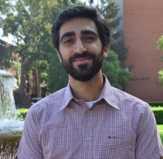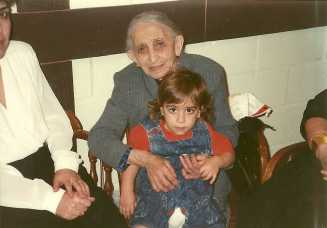Armenian Genocide Researcher Stumbles onto Surprise that Hits Home

 As the program officer of USC Shoah Foundation’s testimonies from the Armenian Genocide, Manuk Avedikyan has pored over thousands documents detailing the names of survivors and towns they came from – many of which now have a new name.
As the program officer of USC Shoah Foundation’s testimonies from the Armenian Genocide, Manuk Avedikyan has pored over thousands documents detailing the names of survivors and towns they came from – many of which now have a new name.
Each testimony is important. Each one is special. But Avedikyan had studied so many of them that they contained few surprises anymore.
And then, while he was recently working on the new Richard G. Hovannisian Armenian Genocide Oral History Collection, something caught his eye. It was a clue that would lead Avedikyan to hearing a familiar voice he hadn’t heard since he was a small boy.
Avedikyan is well suited for his work. He speaks Turkish and several dialects of Armenian. He has a master’s in political science at the American University of Armenia and also worked at the Armenian Genocide Museum Institute in Yerevan and for Armenian newspapers. He’s traveled extensively through the region.
So when his eye was scanning down a spreadsheet, it stopped at the name of a village he recognized. Urnech (now called Konuklar in Turkey’s Yozgat province) is the village his family lived in before the genocide. The place is so small that this was the first time Avedikyan came across it after many months of cataloging hundreds of testimonies.
He looked to the left across the column and saw his own last name.
“That’s interesting,” he thought. “Same village, same last name.”
What Avedikyan had stumbled across was testimony his grandmother gave in 1985, testimony nobody in the family knew anything about. The only other known testimony given in the family was Armanush’s husband, Manuk, whose testimony is in the Zoryan Institute’s Oral History Collection.
 Manuk Avedikyan
Manuk Avedikyan“It was emotional,” he said. “I thought this is an opportunity to get first-person account of our family history."
As family members heard the long-silenced voice, they too became emotional.
“My dad started crying,” Avedikyan said. “He said, ‘I want to hear mom’s voice.’”
Armanush apparently didn’t tell anybody in the family when she gave her testimony in 1985. She died in 1990.
 Top photo: Manuk Avedikyan and his grandparents. Bottom photo: Manuk and his grandmother.
Top photo: Manuk Avedikyan and his grandparents. Bottom photo: Manuk and his grandmother.The recording provided some intriguing details about the family’s history. And she spoke with an eloquence that caught Avedikyan by surprise.
"She named so many lost family members,” Avedikyan said. “The way she described my great grandfather Hagop’s death was different than we thought. Our family had gone into hiding in a nearby Ossetian village named Boyalik and turns out there were many other Armenians with them before they attempted to repatriate back to Urnech in 1918.
“I was really impressed with her Armenian and the dialect she spoke; I thought my father’s side only spoke Turkish,” he said.
And although she was interviewed before her grandson was born, she made an oblique reference to him when she pondered the future for the family.
“She prayed for me to come,” Avedikyan said.